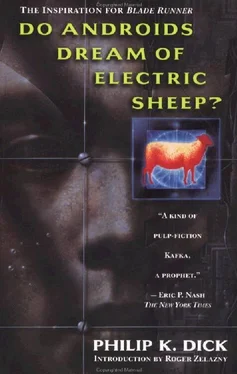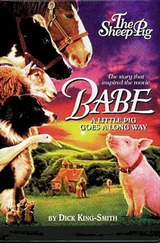He had crossed over in the usual perplexing fashion; physical merging—accompanied by mental and spiritual identification—with Wilbur Mercer had reoccurred. As it did for everyone who at this moment clutched the handles, either here on Earth or on one of the colony planets. He experienced them, the others, incorporated the babble of their thoughts, heard in his own brain the noise of their many individual existences. They—and he—cared about one thing; this fusion of their mentalities oriented their attention on the hill, the climb, the need to ascend. Step by step it evolved, so slowly as to be nearly imperceptible. But it was there. Higher, he thought as stones rattled downward under his feet. Today we are higher than yesterday, and tomorrow—he, the compound figure of Wilbur Mercer, glanced up to view the ascent ahead. Impossible to make out the end. Too far. But it would come.
A rock, hurled at him, struck his arm. He felt the pain. He half turned and another rock sailed past him, missing him; it collided with the earth and the sound startled him. Who? he wondered, peering to see his tormentor. The old antagonists, manifesting themselves at the periphery of his vision; it, or they, had followed him all the way up the hill and they would remain until at the top—
He remembered the top, the sudden leveling of the hill, when the climb ceased and the other part of it began. How many times had he done this? The several times blurred; future and past blurred; what he had already experienced and what he would eventually experience blended so that nothing remained but the moment, the standing still and resting during which he rubbed the cut on his arm which the stone had left. God, he thought in weariness. In what way is this fair? Why am I up here alone like this, being tormented by something I can’t even see? And then, within him, the mutual babble of everyone else in fusion broke the illusion of aloneness.
You felt it, too, he thought. Yes, the voices answered. We got hit, on the left arm; it hurts like hell. Okay, he said. We better get started moving again. He resumed walking, and all of them accompanied him immediately.
Once, he remembered, it had been different. Back before the curse had come, an earlier, happier part of life. They, his foster parents Frank and Cora Mercer, had found him floating on an inflated rubber air-rescue raft, off the coast of New England … or had it been Mexico, near the port of Tampico? He did not now remember the circumstances. Childhood had been nice; he had loved all life, especially the animals, had in fact been able for a time to bring dead animals back as they had been. He lived with rabbits and bugs, wherever it was, either on Earth or a colony world; now he had forgotten that, too. But he recalled the killers, because they had arrested him as a freak, more special than any of the other specials. And due to that everything had changed.
Local law prohibited the time-reversal faculty by which the dead returned to life; they had spelled it out to him during his sixteenth year. He continued for another year to do it secret , in the still remaining woods, but an old woman whom he had never seen or heard of had told. Without his parents’ consent they—the killers—had bombarded the unique nodule which had formed in his brain, had attacked it with radioactive cobalt, and this had plunged him into a different world, one whose existence he had never suspected. It had been a pit of corpses and dead bones and he had struggled for years to get up from it. The donkey and especially the toad, the creatures most important to him, had vanished, had become extinct; only rotting fragments, an eyeless head here, part of a hand there, remained. At last a bird which had come there to die told him where he was. He had sunk down into the tomb world. He could not get out until the bones strewn around him grew back into living creatures; he had become joined to the metabolism of other lives and until they rose he could not rise either.
How long that part of the cycle had lasted he did not now know; nothing had happened, generally, so it had been measureless. But at last the bones had regained flesh; the empty eyepits had filled up and the new eyes had seen, while meantime the restored beaks and mouths had cackled, barked, and caterwauled. Possibly he had done it; perhaps the extrasensory node of his brain had finally grown back. Or maybe he hadn’t accomplished it; very likely it could have been a natural process. Anyhow he was no longer sinking; he had begun to ascend, along with the others. Long ago he had lost sight of them. He found himself evidently climbing alone. But they were there. They still accompanied him; he felt them, strangely, inside him.
Isidore stood holding the two handles, experiencing himself as encompassing every other living thing, and then, reluctantly, he let go. It had to end, as always, and anyhow his arm ached and bled where the rock had struck it.
Releasing the handles he examined his arm, then made his way unsteadily to the bathroom of his apartment to wash the cut off was not the first wound he had received while in fusion with Mercer and it probably would not be the last. People, especially elderly ones, had died, particularly later on at the top of the hill alien the torment began in earnest. I wonder if I can go through that part again, he said to himself as he swabbed the injury. Chance of cardiac arrest; he better, he reflected, if I lived in town where those buildings have a doctor standing by with those electro-spark machines. Here, alone in this place, it’s too risky.
But he knew he’d take the risk. He always had before. As did most people, even oldsters who were physically fragile.
Using a Kleenex he dried his damaged arm.
And heard, muffled and far off, a TV set.
It’s someone else in this building, he thought wildly, unable to believe it. Not my TV; that’s off, and I can feel the floor resonance. It’s below, on another level entirely!
I’m not alone here any more , he realized. Another resident has moved in, taken one of the abandoned apartments, and close enough for me to hear him. Must be level two or level three, certainly no deeper. Let’s see, he thought rapidly. What do you do when a new resident moves in? Drop by and borrow something, is that how it’s done? He could not remember; this had never happened to him before, here or anywhere else: people moved out, people emigrated, but nobody ever moved in. You take them something, he decided. Like a cup of water or rather milk; yes, it’s milk or flour or maybe an egg—or, specifically, their ersatz substitutes.
Looking in his refrigerator—the compressor had long since ceased working—he found a dubious cube of margarine. And, with it, set off excitedly, his heart laboring, for the level below. I have to keep calm, he realized. Not let him know I’m a chickenhead. If he finds out I’m a cliickenhead he won’t talk to me; that’s always the way it is for some reason. I wonder why?
He hurried down the hall.
On his way to work Rick Deckard, as lord knew how many other people, stopped briefly to skulk about in front of one of San Francisco’s larger pet shops, along animal row. In the center of the block-long display window an ostrich, in a heated clear-plastic cage, returned his stare. The bird, according to the info plaque attached to the cage, had just arrived from a zoo in Cleveland. It was the only ostrich on the West Coast. After staring at it, Rick spent a few more minutes staring grimly at the price tag. He then continued on to the Hall of justice on Lombard Street and found himself a quarter of an hour late to work.
As he unlocked his office door his superior Police Inspector Harry Bryant, jug-eared and redheaded, sloppily dressed but wise-eyed and conscious of nearly everything of any importance, hailed him. “Meet me at nine-thirty in Dave Holden’s office.” Inspector Bryant, as he spoke, flicked briefly through a clipboard of onionskin typed sheets. “Holden,” he continued as he started off, “is in Mount Zion Hospital with a laser track through his spine. He’ll be there for a month at least. Until they can get one of those new organic plastic spinal sections to take hold.”
Читать дальше








